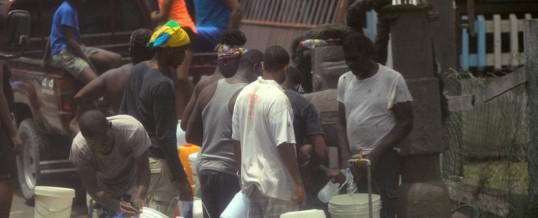
Officials on the Caribbean island of St Vincent have warned that residents are facing water shortages, as ash from La Soufriere volcano has contaminated local supplies.
The volcano erupted again around 6am local time (10:00 GMT) on Tuesday – the fifth-straight day of explosions – and sent plumes of smoke into the air, as well as ash and other volcanic material flowing down its flanks.
Between 16,000 and 20,000 people have been evacuated from areas near the volcano, including about 3,000 who are staying in more than 80 government-run shelters.
La Soufriere first erupted on Friday, after the government had issued a mandatory evacuation order and experts have said people can expect the volcano to keep erupting over several more days.
The Central Water and Sewage Authority has been unable to harvest any water from the water sources since the volcano erupted, government spokesman Sehon Marshall said, which has resulted in a more than 50 percent depletion of water storage.
On Tuesday, dozens of people stood in lines to receive water or pick up money sent by friends and family abroad.
“No water, lots of dust in our home. We thank God we are alive, but we need more help at this moment,” Paul Smart, a retired police officer who was standing in one crowd, told the Associated Press news agency.
The island has been blanketed with ash from the volcano, which has ruined crops and contaminated water supplies.
“We are still looking for drinking water and food,” 43-year-old Jenetta Young Mason, who fled her home in the danger area to stay with relatives, told the Reuters news agency.
During a news conference on local station NBC Radio, Prime Minister Ralph Gonsalves said St Vincent would need hundreds of millions of dollars to recover from the eruption, but did not provide further details.
He added that no casualties have been reported to date. “We have to try and keep that record,” he said.
Gonsalves has continued to urge residents who refused to leave their homes in areas near the volcano to evacuate as soon as they can.
La Soufriere last erupted in 1979, while a previous eruption in 1902 killed about 1,600 people.
On Monday, the spokesman for United Nations Secretary General Antonio Guterres said the entire population on the main island was without electricity or clean drinking water.
Stephane Dujarric said about 20,000 people were in need for shelter, according to reports received from the UN Office for the Coordination of Humanitarian Affairs (OCHA).
“The eruption has affected most livelihoods in the northern part of the island, including banana farming, with ash and lava flows hampering the movement of people and goods,” Dujarric said during a briefing.
APR
2021


About the Author: